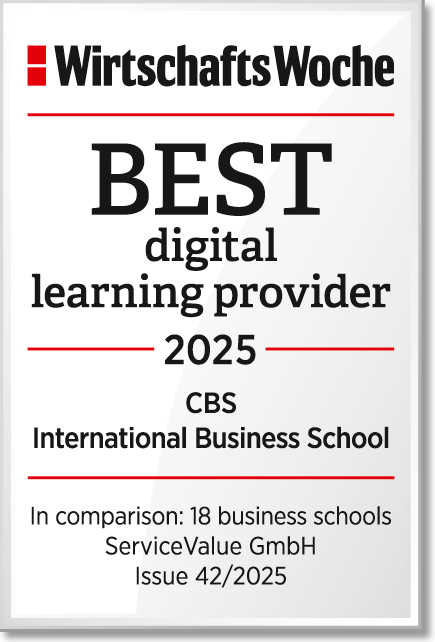Business Psychology and Management (M.Sc.)
Understand People, Shape Businesses – Your Business Psychology Master’s at CBS!

Study Business Psychology – Shape the Future at the Intersection of Psychology and Business
You want to understand what drives people in organisations and how psychology can make management smarter, more human, and more effective? The Master’s in Business Psychology & Management combines behavioural science with modern management to prepare you for leadership in an increasingly complex business world.
The programme focuses on how human behaviour influences organisations, decisions, and change. You’ll explore topics such as Organisational Psychology, Leadership, AI Based Data Research, and Coaching – learning how to design strategies that align people, purpose, and performance. What makes this programme unique is its blend of applied research, diagnostics, and real-world business practice. You’ll gain the ability to analyse behaviour, interpret data, and turn insights into actionable strategies.
At CBS, learning goes far beyond theory. You’ll collaborate with companies on real projects, guided by professors who bring both academic expertise and practical experience.
Studying in Germany – known for its strong economy, innovation, and people-centred management culture – gives you an ideal platform to launch an international career in HR, consulting, or organisational development. From Cologne, a vibrant hub of business and creativity, you’ll learn how to connect psychology and management to create lasting impact.
This study programme is part of our NEW ERA - Master programmes.
*Tuition fees differ for EU and non-EU students. For the specific fees please check the tuition fees information page. Status: April 2025.

What Sets Business Psychology at CBS Apart

Real Projects. Real Impact
Solve real challenges from companies like E&Y, UPS, and KPMG and present your solutions directly to decision makers.
Learn from Leading Experts
Learn from former C-level leaders, managers, and consultants who bring real-world leadership and consulting experience into the classroom.
NEW ERA Education for Future Leaders
The NEW ERA master concept links academic depth with hands-on application. You strengthen analytical thinking, decision making, and the ability to apply knowledge using AI tools and real business formats.
Study Globally. Work Globally
Study in an international community with students from 75+ nations and build the intercultural skills needed for leadership roles in global organizations.
Curriculum
Economic Analysis & International Markets
6
ECTS
- Apply tools of economic analysis to understand market dynamics
- Gain critical insights into international trade, foreign exchange, and interests
- Analyse economic forces in trade policies and global markets
- Understand international capital flows and financial institutions
Strategy Development
6
ECTS
- Apply strategy-making processes and strengthen strategic reasoning
- Turn analysis into sustainable strategy
- Play the strategic chess of business with foresight
- Master decision-making from firm to network level
AI Based Data Research
6
ECTS
- Use AI to automate data collection and analysis
- Generate insights faster — with reproducible, transparent AI research pipelines
- Turn unstructured information into decision-relevant intelligence — at industry speed
- Apply data analytics and scientific methods to real data
Consumer & Advertising Psychology
6
ECTS
- Analyse and understand consumption growth and development
- Know the value of consumer satisfaction, retention, relationship
- Apply psychology to advertising and marketing
- Understand mechanisms of advertising and their underlying strategy
Psychology & Decision Making
6
ECTS
- Understand the principles of human behaviour and experience
- Reflect fundamental findings in general psychology
- Apply instruments of psychological competence
- Get familiar with interventions in conflict management, mediation, coaching, etc.
Empirical Research & Visualisation
6
ECTS
- Design attractive visual narratives that effectively communicate research findings to stakeholders
- Apply visualisation best practices to present empirical evidence in formats that engage audiences
- Master research design principles and methodologies to investigate business questions
- Analyse quantitative and qualitative data using statistical tools to derive meaningful insights
Applied Research Methods & Experimental Psychology
6
ECTS
- Apply concepts of psychological research
- Review models and theories by collecting data
- Interpret and evaluate data in a meaningful way
- Learn to plan, conduct and evaluate a self-designed experiment
Organisational Psychology, HR Development & Coaching
6
ECTS
- Obtain new knowledge of topics, theories and findings in organisational psychology
- Identify potential of employee growth and development
- Analyse different formats and tools of HR development
- Get to know the coaching phases and intervention techniques
Business Model Analysis & Industry Comparisons
6
ECTS
- Adopt a holistic view of corporate business models
- Integrate knowledge from your studies into real business and industry analysis
- Develop practical, cross-disciplinary solutions to complex cases
- Solve complex business model challenges
Managing Change with Projects
3
ECTS
- Become a project manager who contributes to value-based business development
- Set up projects to solve real problems and use project reviews
- Apply the techniques and methods that make projects successful
- Achieve change with change management methods
Leadership & Executive Development
3
ECTS
- Learn core leadership concepts and latest research insights
- Combine scientific principles with practical tools for effective leadership skills
- Strengthen your personal leadership profile through communication skills and confident decision-making
- Develop an understanding of leadership skills for modern organisations
Event Lab
3
ECTS
- Develop an event (TedX/leadership/team building/company/else)
- Design and carry out the event marketing to potential participants
- Organise the event and carry it out in concrete terms
- Perform the event review & retrospective
Consulting Project (with a company)
9
ECTS
- Receive a consulting challenge from a real client company
- Define and scope a real consulting project in a team
- Develop evidence-based solutions and actionable recommendations
- Present your recommendations to the client company
Applied Business Psychology
6
ECTS
- Apply psychological learning principles to foster talent
- Work with psychological goal theories to enhance motivation
- Recognise the value of diversity and diversity management within organisations
- Apply psychological insights to successfully shape leadership in the digital age
Sustainability & Corporate Responsibility
6
ECTS
- Discuss corporate responsibility for social and environmental developments
- Apply stakeholder and double materiality analyses for sustainable strategy development
- Integrate ESG criteria into leadership and decision-making processes
- Strengthen resilience, leadership, and communication through sustainability
Strategic Human Resource Management
3
ECTS
- Develop a strategic alignment of HRM practices
- Consider current HRM trends and best practices
- Get familiar with strategic HRM analysis
- Apply modern methods of HRM
Facilitation, Communication & Negotiation
3
ECTS
- Analyse negotiation scenarios systematically and design effective strategies
- Understand communicative and economic factors that influence negotiations
- Learn how to strategically prepare, conduct and evaluate negotiations
- Develop persuasiveness, tactical thinking and decision-making skills in complex settings
Entrepreneurship & Venture Lab
6
ECTS
- Develop and test innovative business ideas
- Implement the Lean Startup methodology
- Cultivate entrepreneurial thinking
- Develop and define scalable business ideas
Management Simulation Game
6
ECTS
- Lead a virtual company in a simulation
- Make complex managerial decisions
- Assess the impact of business decisions
- Anticipate competitor reactions
Master Thesis
18
ECTS
- Demonstrate mastery of your field by conducting independent research that addresses a relevant business topic
- Apply strategic frameworks and methodologies to analyse complex problems and develop evidence-based solutions
- Synthesise knowledge from multiple disciplines to generate insights and recommendations
- Communicate findings professionally through rigorous academic writing
One Master. Three Tracks
Your career goals are unique, and your study path should be too. That’s why we offer you full flexibility: simply choose the 120, 90, or 60 ECTS track that best matches your academic background, your schedule, and your ambitions. Whether you want to fast-track your entry into the job market or dive deep into specialization, at CBS you can design the Master’s degree that fits your life.
120 ECTS
90 ECTS
Career Prospects with a Master’s in Business Psychology
With a Master of Science in Business Psychology and Management, you will have numerous career opportunities—whether as an independent consultant or as a mid-to senior-level employee in international organisations. The broad range of career paths reflects the practical and future-oriented approach of this Master’s programme, making it an ideal choice for ambitious professionals.
Below, you’ll find top career opportunities with your Master’s in Business Psychology.
Why CBS UNIVERSITY
Your path to CBS
Starting your studies at CBS University of Applied Sciences is as unique as you are – and at the same time, completely hassle-free. With our user-friendly online application process, you can apply from anywhere, with no numerus clausus restrictions. Instead of rigid admission requirements, we focus on a personal selection process that highlights your strengths and potential.
Whether you choose a dual, part-time, or full-time programme, CBS University offers the perfect combination of theory and practice.

Admission Requirements
Application Deadline
You can apply to CBS year-round, even before completing your high school diploma. For dual study programmes, we recommend applying well in advance so we can help you find the right practice partner. The start of your studies is flexible: in the winter semester or, for selected programmes, in the summer semester. To secure one of the limited study places and allow enough time for visa applications if needed, we recommend applying early.
Financing
A dual or part-time study programme is often financed by your practice partner, who also provides valuable professional support. For full-time studies, various funding options such as BAföG or scholarships are available to help you balance your studies and personal development.
HANDS-ON LEARNING AT ITS BEST
At CBS, it’s not just what you study that matters, it’s how you study. Our programmes offer a completely new learning experience: hands-on, interactive, and firmly rooted in real-world practice. You’ll notice your skill set growing day by day through real projects, modern tools, and intensive practical experience. Our lecturers bring years of industry expertise to the classroom, and regular guest speakers give you exclusive insights into professional life. Artificial intelligence, teamwork, presentations, networking, and real business cases are all part of your everyday studies. It’s not just about preparing for the future – it’s about shaping it yourself.
Business Projects
As part of the Business Projects at CBS, students collaborate with renowned companies on real-world projects. This hands-on learning approach combines theoretical knowledge with practical business challenges, providing deep insights into professional workflows.
Corporate Partnerships
With over 1,300 established corporate partners across various industries, CBS students gain exclusive access to the business world. These collaborations offer exciting opportunities, help build valuable networks, and create long-term career prospects.
Internships & Work Experience
Whether through mandatory internships—an integral part of many study programmes—or by incorporating professional experience into dual and part-time study formats, you can apply your expertise directly in real-world settings.
Maximal Praxisnah
An der CBS zählt nicht nur, was du studierst, sondern wie. In unseren Studiengängen erlebst du Lernen völlig neu: anwendungsorientiert, interaktiv und mit direktem Bezug zur Realität. Du wirst sehen, wie sich dein Skill-Set von Tag zu Tag erweitert, durch reale Projekte, moderne Tools und intensive Praxiserfahrung. Unsere Professor:innen bringen langjährige Erfahrung mit, und durch regelmäßige Gastvorträge erhältst du exklusive Einblicke in die Praxis. Künstliche Intelligenz, Teamarbeit, Präsentationen, Networking und reale Business Cases gehören zu deinem Studienalltag. So bereitest du dich nicht nur auf die Zukunft vor – du gestaltest sie aktiv mit.
Business Projects
Im Rahmen der Business Projects an der CBS International Business School haben Studierende die Möglichkeit, gemeinsam mit renommierten Unternehmen an realitätsnahen Projekten zu arbeiten. Diese praxisorientierte Lehrform verbindet theoretisches Wissen mit konkreten wirtschaftlichen Fragestellungen und gewährt tiefe Einblicke in berufliche Abläufe.
Unternehmenskooperation
Dank eines Netzwerks von über 1.300 etablierten Unternehmen aus diversen Branchen profitieren Studierende von exklusiven Einblicken in die Arbeitswelt. Diese Kooperationen eröffnen nicht nur spannende Perspektiven, sondern fördern auch die Entwicklung wichtiger Kontakte und bieten nachhaltige Karrieremöglichkeiten.
Praktikum/Berufserfahrung
Ob in Form von Pflichtpraktika, die fester Bestandteil vieler Studiengänge sind, oder durch die Integration von Berufserfahrung in duale und berufsbegleitende Programme: Du kannst dein Fachwissen direkt in der realen Arbeitswelt anwenden.
HANDS-ON LEARNING AT ITS BEST
At CBS, it’s not just what you study that matters, it’s how you study. Our programmes offer a completely new learning experience: hands-on, interactive, and firmly rooted in real-world practice. Through our approach of combining theory and practice, you can directly apply everything you learn during your part-time master’s program while simultaneously bringing your own professional experience and skills into the courses.
Conventions
Once per semester, an on-campus weekend with an event-like character takes place at rotating CBS locations, each focusing on different thematic priorities. These conventions foster personal exchange, interdisciplinary learning, and hands-on leadership experience.
Learn from Leading Experts
At CBS, you learn from real professionals in their respective fields. Depending on the topic, professors from our faculty design and deliver courses together with external lecturers from the business world.
Specialization
Starting from the second semester, you can optionally choose the specialization “Business Technology.” This allows you to deepen your knowledge in digital transformation and further develop your expertise in technological innovation within an interconnected economy.
HOW DO I FIND MY PERFECT CAREER PATH?
The Career Service and Talent Development team at CBS support you in finding your ideal partner company. With 1:1 coaching, workshops, and a wide network of corporate partners, we guide you throughout your entire time at university. Together, we’ll develop a strategy that matches your strengths and career goals.

Ablauf deS Masterstudiums


Inspiration and Impact – What Our Alumni Say
Let yourself be inspired by the experiences of our alumni and discover how the Master’s degree at CBS has shaped their professional and personal development.
FAQ: The most important questions about studying Business Psychology
Here you can find answers to all important questions all around your Business Psychology master's degree. If you have any further questions, feel free to contact us at any time.
What is Business Psychology and Management?
Why should you choose the Business Psychology and Management degree?
How long does the Business Psychology and Management programme last?
Does the Business Psychology and Management programme have a Numerus Clausus (NC)?
What are the admission requirements for the Business Psychology and Management Master’s?
How is the Business Psychology and Management degree structured?
Where can I study Business Psychology and Management?
What will I learn in the Business Psychology and Management degree? What are the core subjects?
Can I study abroad during the Business Psychology and Management programme?
Can I write my Master’s thesis with a company in Business Psychology and Management?
Any questions? We're here to help
Do you have any questions about our bachelor's or master's degree programs? Our Student Advisory team is here to support you! Schedule your personal consultation—online or in person—for tailored, non-binding guidance on finding the right study program for you.
































